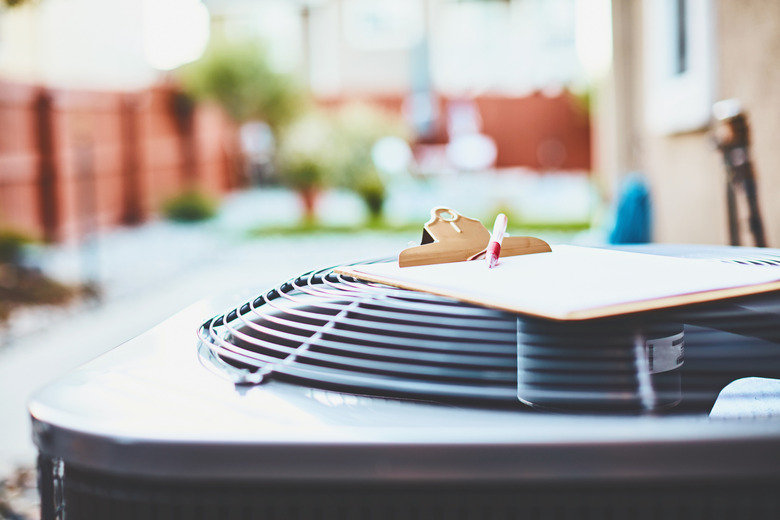My Air Conditioner's Fan Is Moving Slow
We may receive a commission on purchases made from links.
A slow-turning air conditioner fan is not good news during the dead heat of summer. Your AC is an important part of the HVAC system, and it requires a fast fan to push the cooled air throughout your home. While a number of fan problems require a technician, some issues can be remedied with basic troubleshooting.
Tip
A slow-moving air conditioner fan can be due to your chosen settings or problems with components, including the bearings, run capacitor and belt. Debris can also get in the outside unit and slow down the fan.
Air Conditioner Setting
Air Conditioner Setting
Some air conditioner units feature a fan button that allows the user to select a fan speed. The air conditioner might be set to "Low," which means the fan turns slowly and produces minimal air circulation, creating a problem when a room is stiflingly hot.
A press to the "Fan Speed" button increases the fan speed to the next level, and yet another press to the button advances it even further. Your air conditioner might feature fan speeds of Low, Medium and High. A high fan speed is the maximum and commands the internal fan to turn quickly, producing maximum air circulation.
Debris in the Fan
Debris in the Fan
Debris, such as a plastic bag or string, can get sucked up into the intake grille or inserted by a child. The debris wraps around the fan and hinders its movement, which causes the fan to turn slowly. Also, if the fan is improperly installed in the air conditioner, the fan blades might strike the sides of the fan housing, which slows the rotation of the fan.
Front or side panels to the unit can be removed using screwdrivers to reveal the fan compartment. Remove any debris you find. While you have the unit open, use a damp cleaning cloth to wipe the fan blades.
If you inspect the inside of the fan housing, areas where the fan strikes the housing could be apparent. If the fan strikes the housing, the fan should be removed and reinstalled properly. Checking the fan regularly during air conditioner maintenance can prevent problems with debris.
Issues With the Bearings
Issues With the Bearings
If the bearings of the evaporator fan are grimy or dirty, the fan doesn't turn as freely as it could. When the panels of the air conditioner are removed to reveal the evaporator fan compartment, give the fan a turn by hand. The ball bearings need to be oiled with electric motor oil if the fan doesn't turn freely. If the fan turns easily, the bearings are fine and the fan capacitor might be damaged. A technician should be called for repairs.
Run Capacitor Issues
Run Capacitor Issues
Another important HVAC component is the run capacitor. If it's weak or starts to fail, the fan might slow down. You can still hear the compressor running if this is the cause of the slow air conditioner fan. It's best to shut off the air conditioner and wait for a professional to evaluate it to prevent damage to the unit.
Fan Belt Damage
Fan Belt Damage
Some air conditioners use a belt-driven fan motor to push the cooled air throughout your home. Normal use results in wear and tear on the belt, which can leave it stretched or cracked. When this normal wear happens, it can slow down the fan. Sometimes the fan stops completely. You need to replace the belt to get the fan turning again.
Ice in the Unit
Ice in the Unit
While a slow-turning fan can cause ice buildup inside the unit, ice can also build up due to outside weather conditions or a malfunctioning thermostat. When ice builds up within the unit, it blocks air from blowing from the vents, which mirrors the effect of a slow-turning fan.
If outside weather is lower than the thermostat setting and the unit is set to cool, the unit might freeze. Also, if the thermostat is broken, this can cause the compressor to continuously run after the fan shuts off. This causes the unit to freeze and you'll need to defrost the central air unit.
